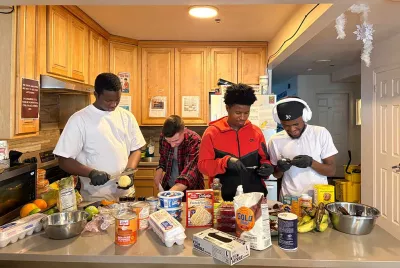Putting SNAP to Work for Youth Facing Homelessness

When Krystal* lost her SNAP benefits last summer, she struggled to both pay her bills and keep her two small children and herself fed. “We didn’t have much food without it,” she says of the nutrition benefit available through the U.S. Supplemental Nutrition Assistance Program. “It was a struggle for us to be full.”
Krystal had lost her benefits because she had found employment. “I was making $10 an hour, with two babies, utilities, and rent that was $1,000 a month,” she says. “Every piece of money was going towards our living situation.”
Now a resident of Covenant House New Orleans, Krystal has successfully reapplied for SNAP benefits, but her experience of dealing with the food benefits program reveals just how critical it is and, yet, how especially cumbersome for young people working to overcome homelessness.
As the U.S. Congress approached the deadline for reauthorizing the farm bill on Sept. 30, an exercise it goes through every five years, Covenant House joined with two other youth-centered organizations, SchoolHouse Connection and National Network for Youth, to advocate for changes to the bill that would improve SNAP’s delivery, consistency, and application for young people experiencing homelessness.
Although the deadline for Congress to act decisively on the bill has come and gone, the farm bill still needs to be extended or reauthorized by the end of 2023.
Covenant House and our allies remain adamant that the changes we propose are crucial for more effectively meeting the nutrition needs of young people and young families experiencing homelessness, and we will continue to advocate with lawmakers for them.
We are urging lawmakers to adopt the following changes:
- Incorporate the Training and Nutrition Stability Act into the farm bill, allowing youth facing homelessness and enrolled in SNAP Education + Training to maintain food benefits while receiving additional income through the federal job training programs SNAP E+T provides.
- Implement a trauma-informed approach to accessing SNAP benefits whereby SNAP administrators are trained in a trauma-informed manner for processing youth eligibility and/or staff at community-based organizations, like Covenant House, who are already practiced in trauma-informed care, are trained to administer SNAP benefits.
- Codify SNAP provisions for college students, allowing college students who qualify for this benefit to access it, with an emphasis on college students who are experiencing homelessness or have experience in the child welfare system.
- Ensure the most vulnerable youth experiencing homelessness have access to nutritious meals by reimbursing programs that shelter youth ages 18 to 25, like Covenant House, for soaring food costs.
Although young people and young families at Covenant House count on three nourishing meals each day, thanks to the generous contributions of our supporters and community partners, our staff help youth apply for SNAP benefits.
That’s because many young people will stay with us only for a short while or they may come and go multiple times before settling into our programs, and we want to ensure they have consistent access to nutritious food. For other youth, having access to SNAP gives them options for food they can manage themselves, underscoring one of our five Covenant House principles: choice.
“SNAP is a good program,” says Krystal, “but it’s sometimes hard to get because they don’t understand how having kids or a job or bills makes it harder to keep SNAP.” When applying, she says, “Having to give so much information when you’re homeless is really hard. I can’t track down all that information so quick, but my kids and I are hungry until we get it.”

Youth often have complicated relationships with their families of origin, where they may already be included in SNAP benefits but unable to access them. Some youth are reluctant to have a portion of their family’s benefit transferred to them, fearing that in doing so they will jeopardize the nutritional security of siblings still at home. A trauma-informed approach to eligibility would address these special circumstances.
As Krystal found, youth sometimes feel SNAP punishes them for working by taking away their nutrition benefits before they’re able to establish independence. At some of our sites, youth have signed up for the SNAP E + T program, where they engage in paid training or internships. On completion of the training or internship, though, they may lose their food benefit.
“Benefits cease when a youth’s income is such that the benefits are no longer applicable based on current SNAP eligibility guidelines,” notes Deneen Jackson, interim director of programs at Covenant House New Orleans. “The continued benefits are vital for success until youth become employed at a livable wage or a wage reflective of sustainability.”
At Covenant House California, says Senior Vice President of Development and Administration Heather Flynn, “Almost half the youth we served lost SNAP eligibility once they were employed. Unfortunately, none of them made enough to move out of our housing programs, so they weren’t able to benefit from the training to continue their upward mobility and ensure they could leave homelessness behind with a living-wage job instead of struggling with minimum-wage jobs.”
But there are ways to take a good program like SNAP and make it better, specifically for young people working to overcome homelessness. Incorporating the Training and Nutrition Stability Act into the farm bill, would help youth now and in the future. “Covenant House New Orleans youth would be able to fully focus on job readiness, training, and education,” Deneen says of the youth at her site.
“Furthermore,” she adds, “this support would alleviate undo stress, providing less strain on mental health and alternative supports otherwise required as a direct result of making youth choose between ongoing job training and nutritional assistance.”
*Krystal is a pseudonym, used to protect our youth’s privacy.
Title photo: On Capitol Hill advocating for young people facing homelessness, from left to right are Anna Powers, Covenant House associate vice president, policy and advocacy; Barbara Duffield, executive director, SchoolHouse Connection; Lori Maloney, Covenant House senior vice president, program operations and advocacy; and Khadija Jahfiya, professional staff member on the Senate Agriculture, Nutrition, and Forestry Committee for Chairman Stabenow.
You Might Also Like...
All news & insightsShelter Is Only the Beginning
From crisis to care: Find out what it's like when a young person enters our doors.


